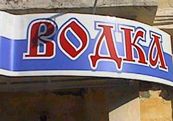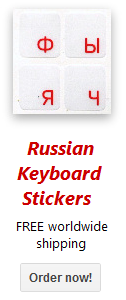 FR FR |
About us | Home | User agreement | Link to us |
The Personal Pronouns
Usage
Pronouns are words that are used as substitutes for nouns. They do not name objects, their characteristics or quantity but only refer to them. There are nine types of pronouns in Russian.
Let's take a look at the Russian personal pronouns.
- я (I)
- мы (we)
- ты (you - singular; thou*)
- вы (you - plural)
- он (he)
- онá (she)
- онó (it)
- они (they).
*In Russian, as in many other languages, ты (thou) is used generally among people very familiar with each other, or by superiors to inferiors.
The Person
As you may know, the first person grammar term refers to someone who is the author of the narration. Therefore я, мы are the first person pronouns; they refer to the speaker.
Я стал
медленно взбираться на холм.
I started to climb the hill slowly.
(я refers to someone who is
actually saying this sentence)
In addition, the pronoun мы refers to people who perform an action along with the speaker.
Мы все
éли яблоки: и я, и Миша, и Толя, и
Дима.
We were all eating apples: I and Misha and Tolya and Dima.
(мы refers to all people who
were performing an action)
The second person describes someone who was addressed by the utterance. In other words, it is the person you are talking to. Therefore ты, вы are the second person pronouns; they refer to one or more people.
Лéна,
ты тáк хорошó поёшь.
Lena, you sing so well.
(ты
substitutes for Lena, the
person being addressed)
Когдá
вы пойдёте на пляж?
When will you go to the beach?
(вы substitutes for the people
addressed)
The third person pronouns он, она, оно, они refer to the person or thing being talked about.
Он
заинтересовáлся игрóй.
He became interested in the game.
Онá
былá единственным ребёнком в семьé.
She was the only child in the family
Они встáли
и поздорóвались.
They stood up and greeted.
Declension
All personal pronouns change by cases.
Я, ты, мы, вы
| Case | Singular | Plural | ||
| Nominative | я | ты | мы | вы |
| Genitive | меня | тебя | нас | вас |
| Dative | мне | тебе | нам | вам |
| Accusative | меня | тебя | нас | вас |
| Instrumental | мной | тобой | нами | вами |
| Prepositional | (обо) мне | (о) тебе | (о) нас | (о) вас |
Он, она, оно, они
| Case | Singular | Plural | ||
| Nominative | oн | oнa | oнo | oни |
| Genitive | его | её | его | их |
| Dative | ему | eй | ему | им |
| Accusative | его | её | его | их |
| Instrumental | им | ей, ею | им | ими |
| Prepositional | (о) нём | (о) ней | (о) нём | (о) них |
The personal pronouns do not change by number, they belong to either singular or plural number. я, ты, он, она, оно are always singular. мы, вы, они are always plural.
All personal pronouns are used in all six cases.
The nominative:
Мать спрашивает: «Кто это?»
Сын отвечает: «Это я, ты, он, она (singular),
мы, вы, они (plural)»
The Genitive:
Мать
спрашивает: «У кого есть книга?»
Ребёнок отвечает: «У меня, у тебя, у
него, у неё есть книга (singular), у нас, у
вас, у них есть книга (plural)»
The Dative:
Кому мать даёт книгу?
Мне, тебе, ему, ей (singular), нам, вам, им
(plural) даёт мать книгу.
The Accusative:
Кого спрашивает мать?
Меня, тебя, его, её (singular), нас, вас, их
(plural) спрашивает мать.
The Insturmental:
Кем довольна мать?
Мной, тобой, им, ей, ею (singular), нами, вами,
ими (plural) довольна мать.
The Prepositional:
О ком думает мать?
Обо мне, о тебе, о нём, о неё (singular), о нас,
о вас, о них (plural) думает мать.
Related Lessons
Got questions?
Ask them in the Russian Questions and Answers — a place for students, teachers and native Russian speakers to discuss Russian grammar, vocabulary, pronunciation, and other aspects of the Russian language.
Copyright 2001-2026 MasterRussian.com | Privacy Policy | Contact Us
 Russian Lessons
Russian Lessons
- Russian alphabet
- Names of letters
- Russian Q&A new
- Pronunciation: Cons.
- Pronunciation: Vowels
- Noun Gender/Number
- Cases of Nouns
- Russian Greetings
- Personal Pronouns
- Learning Russian
- 1000 Common Words
- 500 Russian Verbs
- Top Russian Nouns
- » All lessons
- » Guest lessons
 Browse Topics
Browse Topics
- Start learning Russian
- Forum
- Bookstore
- Dictionaries
- Russian - basic
- Russian - adv
- Pronunciation
- Russian Blog new
- Reading
- Test & quizzes
- Translation
- Verbs
- Verb Conjugations
- Russian numbers
- Russian Tests new
- Vocabulary
- Writing
- Folk music
- Fun stuff
- Leo Tolstoy
- Learner's lore
- Literature
- Personal blogs
- Picture Dictionary new
- Proverbs
- Publications
- Radio & TV
- Russian culture
- Schools in Russia
- Russian Words
- Russian names
- Software
- Russian Words iPhone
Clicks the "Like" button below to get daily updates on Facebook!
Click "Add to circles" to learn Russian on Google+

Search MasterRussian

English » Russian dictionary

WORD OF THE DAY
![]() RSS
|
iGoogle
|
My Yahoo!
RSS
|
iGoogle
|
My Yahoo!
Meaning: road, route, way
Pronunciation: [dah-ROH-gah]
Learn Russian words! »
TODAY'S STREET SIGN

Russian: Водка
English: Vodka
FOLLOW US ON TWITTER

MasterRussian on Twitter


